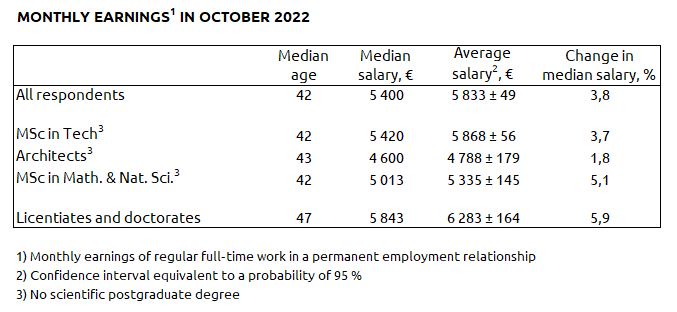
According to the recent labour market survey conducted by the Academic Engineers and Architects in Finland TEK, the median salary of academic engineers was 5 420 euros per month in October 2022. The median salary increased by 3.7 percent from the previous year. Other degree categories also showed a positive trend in terms of salary. The biggest increase, 5.9 percent, was seen in the median salary of postgraduate degree holders, that is, holders of a doctor's or a licentiate degree.
Although nominal salaries increased, real salaries decreased. According to Statistics Finland, the year-on-year change in consumer prices was 8.3 percent in October.
“Real earnings have fallen dramatically and if the trend continues this will definitely reduce consumption in Finland. As a consequence, the predicted recession will be deeper and longer than it would be if we tried to maintain Finnish purchasing power,” says Teemu Hankamäki, Labour Market Director at the Academic Engineers and Architects in Finland TEK.
Hankamäki also points out that while the past is almost impossible to patch up, we can make a difference in how the future unfolds.
“Wrongs have been committed, but I now call on companies to take responsibility for the issue. The economic situation of industrial companies is looking good and the order books are well-filled. They can afford to increase salaries to maintain purchasing power.”
Changing jobs increases your salary the most
Of the respondents working full-time, 81 percent said that their salary had increased from the previous year. 11 percent saw their salary remain the same, and 3 percent stated that they had received a pay cut.
By far the most common reason for increased salaries was a general increase, which was the case for 66 percent of the respondents whose salaries had increased. Of these respondents, 30 percent had received a raise based on personal performance or merit. 13 percent of those whose salaries had increased stated that the reason for the increase was a new position with the same employer, and likewise 13 percent had received a raise after changing jobs to work for a different employer.
“The biggest increases were seen by those who had changed jobs. Their monthly salaries increased by 785 euros on average. Our previous surveys also indicate that changing jobs is the best way to get a decent raise,” says Tuunia Keränen, Salary Researcher at the Academic Engineers and Architects in Finland TEK.

About the labour market survey
The data for the labour market survey was collected in October–November 2022, and the survey was aimed at TEK members in the labour market. The survey received roughly 9 100 responses and the response rate was about 20 percent. The number of respondents and the response rate were the same as in the year before.
Of the respondents, 74 percent were men and 26 percent women. The median age was 42 years. The majority of the respondents, 91 percent, were employed full-time. 85 percent of the full-time employed respondents worked in the private sector, and about half of them worked in industry. The percentage of full-time entrepreneurs was 1.4 percent. 2.2 percent of the respondents were unemployed or laid off.
What topics does TEK study?
We at TEK are constantly researching the field of technology: employment, salaries, equality, and coping with work or studies, for example. We have studied and published information on many themes for years – you are welcome to examine and compare the results using, for example, time series visualizations. Read more about our research: www.tek.fi/research